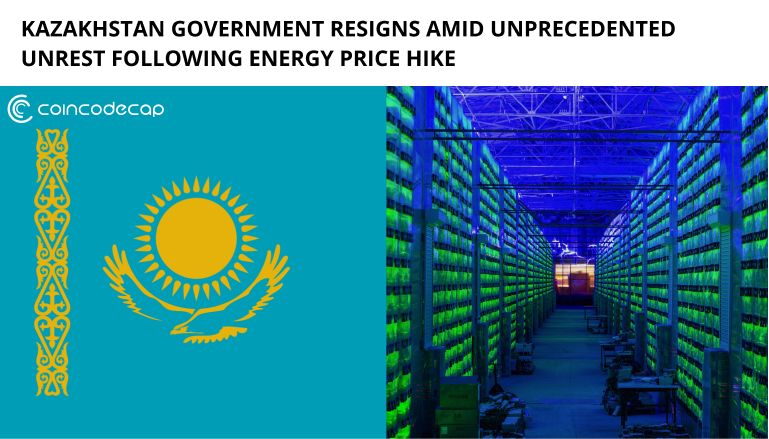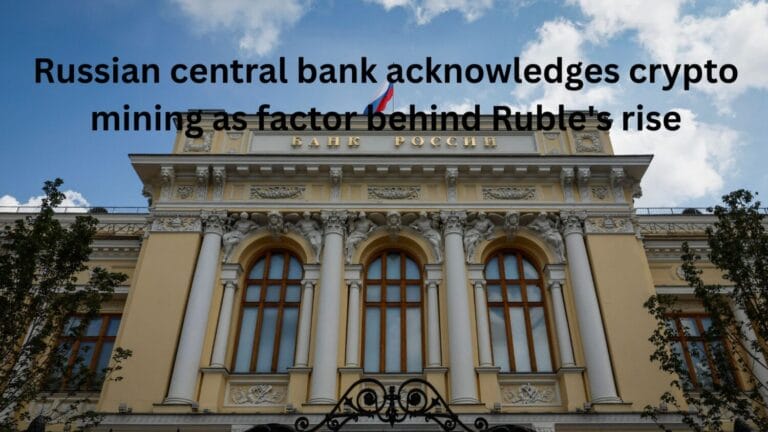Key Takeaways:
- Kazakhstan government resigns amid unprecedented unrest following the energy price hike.
- Kazakhstan isn’t the only country where illegal cryptocurrency mining is a problem.

Tokayev had already declared states of emergency in Almaty, the country’s largest city and an oil-rich western province, following historic protests that began over a regional energy price hike and spread across the enormous ex-Soviet country.
From late Tuesday, the southeastern city of Almaty, Kazakhstan’s financial capital, was in chaos as police used tear gas and stun grenades to quell unrest that began in the country’s west over a rise in local Liquified Petroleum Gas prices (LPG).
Kazakhstan’s president dismissed the country’s government on Wednesday in an attempt to prevent significant unrest across the country as a result of an increase in energy prices.
After thousands of people took to the streets to demand the government’s resignation, President Kassym-Jomart Tokayev declared states of emergency in Almaty, the financial capital, and Mangystau, the western region.
Tokayev proclaimed a state of emergency in Almaty and the oil-rich Mangystau area in the west between Jan. 5 and 19 to ensure public security as protests expanded across the country earlier in the day. In Almaty, the country’s former capital, he also enforced a curfew when thousands of people took to the streets.
“In accordance with Article 70 of the Republic of Kazakhstan, I hereby resolve to accept the resignation of the government of the Republic of Kazakhstan,” Tokayev stated.
Tokayev accepted the resignation of Prime Minister Askar Mamin’s government, according to a separate order posted on the presidential website Wednesday morning.
According to the directive, Deputy Prime Minister Alikhan Smailov would operate as Prime Minister until a new cabinet is constituted.
Following China’s crackdown on Bitcoin mining, Kazakhstan emerged as one of the world’s winners in attracting Bitcoin miners earlier this year. Producing the world’s largest cryptocurrency necessitates specialised computers to solve complicated encrypted puzzles, and electricity is the company’s most considerable operating expense. So Kazakhstan’s argument was straightforward: the country’s cheap and plentiful coal power would make it one of the most profitable places to do business in the world. The miners then surged in.
According to reports, cryptocurrency mining has created a power outage in Kazakhstan. According to the Financial Times, there were power shortages and even shutdowns at three power plants in October due to bitcoin miners’ surge in demand for electricity.
The disturbance began due to a rise in LPG prices in the hydrocarbon-rich Mangystau region. Still, a government initiative to cut the rates in response to demonstrators’ demands failed to calm the situation.
According to independent media reports, Tokayev’s the announcement of a new price of 50 tenges (11 US cents) per litre, down from 120 at the start of the year, did not deter demonstrators in Zhanaozen and Mangystau’s capital Aktau from voicing new demands.
Aktau footage has been circulated on social media. Thousands of protestors were besieged by police on Tuesday after camping in the city centre overnight.
The protestors retaliated with stones when police used stun grenades and teargas to disperse them. There were also reports of clashes between police and demonstrators and protestors vandalising and torching police cars.
Access to social media apps such as Facebook and Telegram has also been banned by the authorities.
The protests began on Jan. 2 in the city of Zhanaozen in Mangystau, when drivers staged a protest against an increase in LPG prices, which then expanded to Aktau.
From 2022 onwards, the Kazakhstan government will charge registered miners a compensation cost of 1 tenge (about $0.0023) per kWh in an attempt to make this work.
However, Kazakhstan isn’t the only country where illegal cryptocurrency mining is a problem. Iran has had a similar dilemma in that it has 50 Bitcoin-registered mining plants, but 85 of the country’s overall mining operations are said to be illegal.









